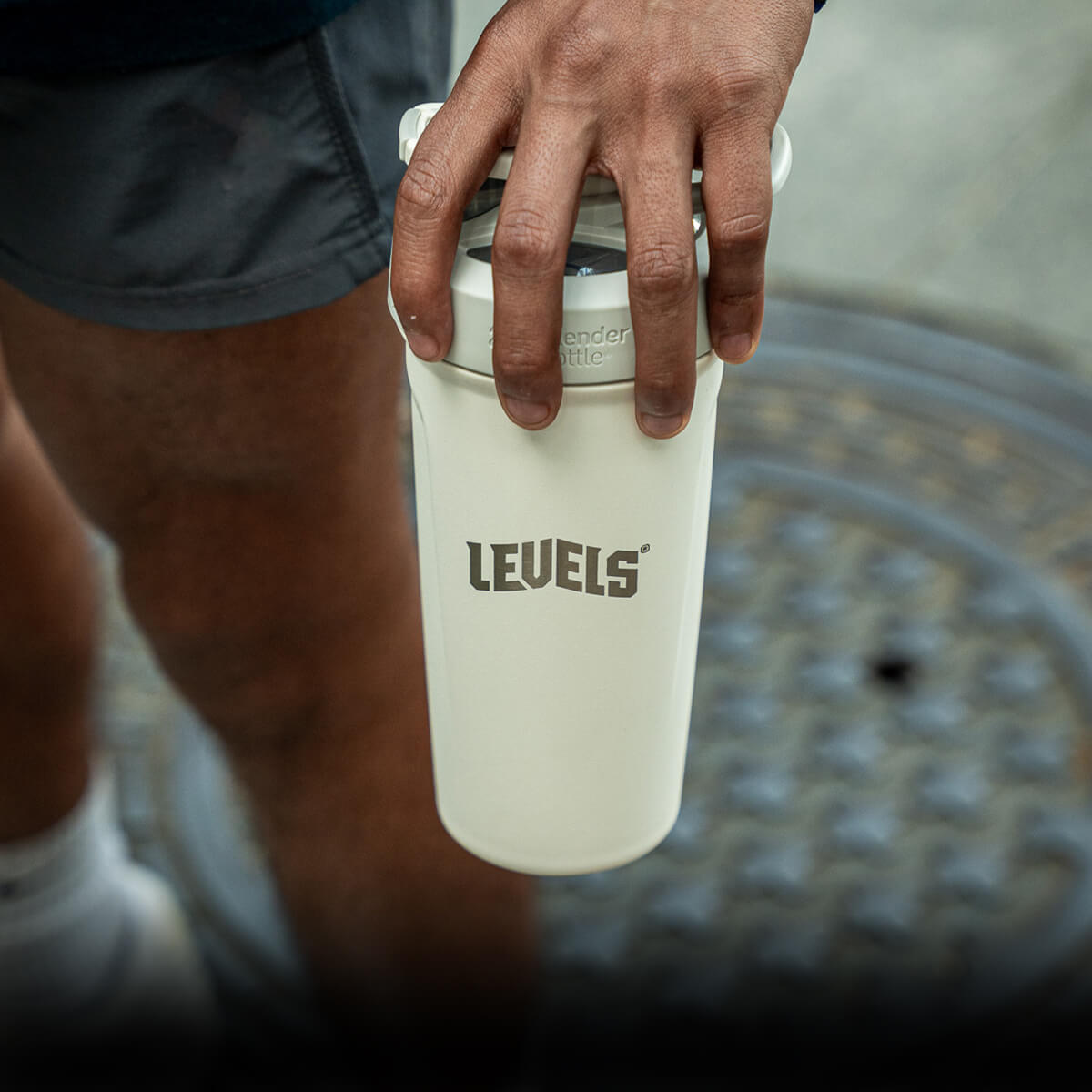Whether your goal to lose fat, build muscle, or maintain weight, the occasional weigh-in can help you stay on track.
But if you step on the scale one day and notice a sudden jump of 5 to 10 pounds, you might feel perplexed (or if your goal is to gain lean muscle mass, overjoyed may be a better word).
One potential cause of rapid weight gain is creatine supplementation. In this article, you’ll learn why creatine sometimes causes weight gain, how much weight people usually gain on creatine, what that means for your physique and health, and what you can do about it.
What Is Creatine?
Creatine is a sports supplement people take to perform more reps, lift heavier weights, and become more explosive.
It’s also a naturally-occurring compound your body uses for energy production during exercise[*][*].

Your body normally produces about 1 gram of creatine per day from the amino acids arginine, glycine, and methionine[*]. You can also obtain it from foods like rare steak, which contains 3 grams per pound[*].
When people take creatine monohydrate, the most popular and best-studied form, they typically use 3-5 grams per day. As a result, their muscles reach saturation levels of creatine after about 4 weeks[*].
Another strategy to get faster results from creatine is to use a loading phase[*]. During the loading phase, people take 20-30 grams of creatine per day for a week, then a lower daily dose afterward.
Because your body uses creatine to recycle energy, increasing your creatine muscle levels via supplements can enhance your performance on short-burst, heavy, or explosive movements[*][*].
The strength benefits of creatine can also help you add lean muscle mass. When you can lift heavier, you can also gain muscle faster — it’s as simple as that.
Can Creatine Make You Gain Weight? Why?
The short answer is: yes, creatine can make you gain weight.
Studies demonstrate that you can gain weight rapidly when you take creatine, especially if you use a loading phase.
For example, a 2003 study found that after 30 days of high-dose creatine supplementation, the participants gained an average of 3.75 pounds[*].
And a more recent 2016 trial showed that in young soccer players, 7 days of creatine loading led to 2.2 pounds of weight gain, on average[*].
But importantly, the majority of weight gain from both studies (and other similar creatine studies out there) comes from extra water weight.
The fact that most creatine weight gain comes from water is good news if you were worried about fat gain. On the other hand, if your goal is hypertrophy, you might be slightly disappointed to learn that you didn’t suddenly acquire 5 pounds of lean muscle mass overnight.
For most people, though, it’s no big deal either way — unless you’re a weight class athlete who needs to maintain a specific weight.
Keep reading to explore the implications of creatine weight gain according to your physique goals!
Does Creatine Make You Fat?
If you’re in the middle of a fat loss phase and begin supplementing creatine, you could be caught off guard by the sudden weight gain that might result.
But the positive news is that creatine definitely doesn’t lead to fat gain. Any rapid weight gain you experience from creatine is virtually guaranteed to be water weight gain.
Numerous studies show that short-term creatine supplementation may lead to increased water weight, but does not increase body fat levels[*][*][*].
Because creatine doesn’t contain usable calories and doesn’t appear to interfere with your body’s ability to burn fat, there’s no downside to taking it if your goal is weight loss.

And because taking creatine increases your lifting performance, and lifting weights during fat loss is excellent for your body composition, taking creatine to lift heavier weights during fat loss is a smart idea[*].
If gaining a few extra pounds still freaks you out, though, don’t miss the section “What to Do If You Gain Weight on Creatine” below.
Creatine and Water Retention or Bloat
The reason creatine supplements sometimes cause water retention is because creatine is osmotic[*].
In other words, when you increase your body’s creatine levels, the creatine can pull in extra water along with it.
And research shows that creatine supplementation increases intracellular and extracellular water — that is to say, water levels inside as well as outside of your cells rise[*].
Storing more water inside cells could have a favorable effect on your appearance by making you look more muscular or at least “bigger.” Conversely, extracellular water (outside of your cells) could lead to minor “bloating” effects that visually resemble fat gain.
Also, you may have heard from fitness gurus that creatine supplements don’t cause bloating, but that’s incorrect.
Most studies on the subject show that creatine can increase overall water retention, and at least one study showed an increase in extracellular water but not intracellular water[*].
Bottom line: creatine sometimes, but not always, causes water weight gain, which can either make you look more muscular, more bloated, or both. It varies depending on the individual.
Creatine for Gaining Muscle Weight
For reasons we’ve already covered, creatine is one of the best muscle-building supplements of all time.

However, any rapid weight gain right after you start creatine is unlikely to be from legit lean muscle mass.
If you experience intracellular water retention while taking creatine, your body may appear more muscular. But studies are clear that a few days to a month of creatine supplementation is highly unlikely to result in significant, instantaneous lean muscle mass gains[*][*].
Keep in mind that creatine primarily works for adding muscle mass by increasing your performance in the gym.
While getting a couple more reps on your heavy sets certainly pays off over time, it’s not going to add 5-10 pounds of muscle in the next few weeks.
What to Do If You Gain Weight on Creatine
When you gain water weight on creatine, at least you know it’s working.
And aside from any psychological impact of weighing more or any minor changes in your appearance, creatine water retention is harmless.
Therefore, the best thing you can do is nothing — if possible, just don’t worry about it. Keep eating right and training hard, and you’ll get better results thanks to taking creatine.
In fact, your body might shed the extra water weight on its own, even if you continue using creatine. Thanks to a process called homeostasis, our bodies tend to balance out naturally over time.
But what if the water weight gain really bothers you, or you’ve got a beach trip coming up and don’t want to look bloated?
Simple: take a break from creatine.
Your body naturally breaks down and eliminates about 1-2% of its creatine stores per day, so even if your muscles are fully saturated, you should return to baseline within a month — perhaps much faster (more creatine math here)[*].
And fortunately, when you resume creatine, if you don’t load it or if you take a lower dose than before, you’re less likely to experience water retention.
According to a 2017 study examining the effects of low-dose, short-term creatine supplementation, “Potentially, the increased total body water associated with creatine supplementation does not occur with low doses of creatine ingestion”[*].

To sum up: if creatine bloat is somehow ruining your life, take a month-long break, then consider resuming without loading, possibly also using a lower dose (3-5 grams per day at most).
All that said, while creatine water retention is harmless, you should still see a doctor if you’re concerned about recent rapid weight gain, especially if you’re experiencing other symptoms, take medication, or have a medical condition.
Creatine Safety, Side Effects, and Who Should Use It
Along with whey protein, creatine is one of the safest, best-studied supplements on the market.
Extensive research shows creatine is almost universally safe, with no serious adverse effects for individuals ranging from infants to seniors[*].
And studies even suggest that for healthy individuals, even mega-doses of 30 grams per day are probably safe for 5 years or longer[*].
One fairly common yet minor side effect of creatine is an upset stomach or related issues[*]. Similar to creatine bloating, the odds are high that these digestive effects are due to the osmotic effects of creatine.
If you experience gastrointestinal distress after taking creatine, try these tips:
- Take lower doses spread throughout the day instead of one big dose
- Dissolve it in hot water first
- Switch to a micronized (finely-ground) brand of creatine
- Instead of loading with high doses, take 3-5 grams per day
That’s pretty much it. Other than bloating or a mild upset stomach, there’s basically nothing to worry about from creatine supplementation.
Also, while you may have heard rumors that creatine causes hair loss, that’s quite unlikely.
So who should take creatine?
From a cost-benefit perspective, anyone who wants to add lean muscle or improve their fitness should strongly consider it.

And even if you don’t care about gaining muscle or enhancing your physical performance — or for that matter, even if you don’t exercise at all — you can still benefit.
Research suggests creatine may help protect against traumatic brain injury, reduce the effects of stress and sleep deprivation, and increase mental performance[*][*][*].
We’re not saying you need to take creatine, but if you’re currently taking any supplements, there’s a decent chance creatine has more scientific evidence backing it than what you’re using. Food for thought.
The Bottom Line
Creatine won’t make you fat, won’t add 10 pounds of instant muscle to your frame, and probably won’t make you go bald.
What creatine will do is enhance your performance in the gym, enable you to gain more muscle mass, and boost your brain health and mental function.
It might or might not cause you to gain a few pounds of water weight, which could make you look more muscular or slightly bloated.
You won’t know until you try it, and if the water weight bothers you, you can take a break, then resume creatine at a lower daily dose. Either way, the odds are high that no one but you will notice, anyway.














